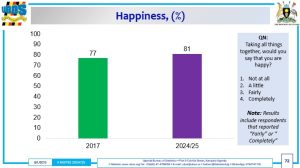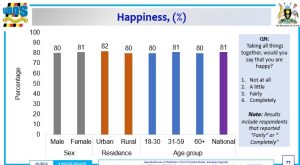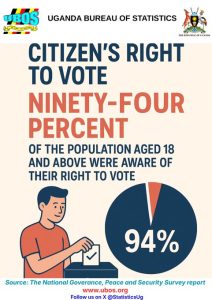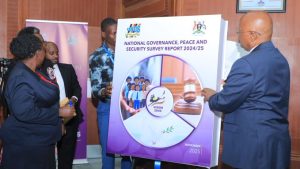Ugandans are reporting higher levels of happiness than they did seven years ago, according to the newly released National Governance, Peace and Security Survey (NGPSS) 2024/25 by the Uganda Bureau of Statistics (UBOS).
The report shows that 81% of adults describe themselves as “fairly” or “completely” happy, up from 77% in 2017.
Presenting the findings, UBOS Officer Shifah Ndagire said the results indicate “a significant improvement in personal well-being across key demographic groups, despite persistent national challenges.”

Happiness Levels Rise Across the Country
The survey asked respondents: “Taking all things together, would you say that you are happy?” Those who selected “fairly” or “completely” were classified as happy.
Key findings include: National happiness level: 81% (up from 77% in 2017), Urban happiness: 82%, Rural happiness: 80%, Female respondents: 81%, Male respondents: 80% and Age ranges (18–30, 31–59, 60+): All between 80% and 81%.
Ndagire noted that the consistency across gender, age and location is “a strong indicator that most Ugandans feel personally secure, optimistic, and generally content with their lives.”

The report was officially launched on 18 November 2025 by Ms Rosette Nakavuma, a UBOS Board Member representing the Minister of State for Finance in charge of Planning, Hon. Amos Lugoloobi.
She emphasised the survey’s importance in shaping governance and development policies.
A Paradox of Happiness Amidst National Challenges
Despite the strong happiness ratings, the survey paints a more complicated national picture.

According to Ndagire, “Ugandans are happy in their personal lives, but they remain deeply concerned about issues like poverty, corruption and social trust.”
Key governance findings include: 93% trust the justice system, 82% trust the government to protect them and their property (up from 72% in 2017), 69% are satisfied with their last experience with public services, 57% are aware of government efforts to fight corruption, 24% reported experiencing discrimination, 60% feel safe walking alone at night and 14% paid a bribe in their last contact with a public official.
Additionally, 94% of adults know their right to vote, 89% are aware of human rights, and 73% say they work in harmful conditions.

These findings reflect what analysts have called a “happiness paradox”—high personal satisfaction coexisting with major governance and socio-economic concerns.
Global Context
Uganda’s rising national happiness levels contrast with its position in international rankings. The World Happiness Report 2025 placed Uganda 116th globally with a score of 4.5, a slight improvement from the previous year. Uganda’s international ranking is based on the World Happiness Report, while its national perception is influenced by factors like satisfaction with direction.
Experts say this gap highlights differences between global metrics, which emphasise income and social trust, and local perceptions, which prioritise personal security, resilience, and satisfaction with the country’s overall direction.












